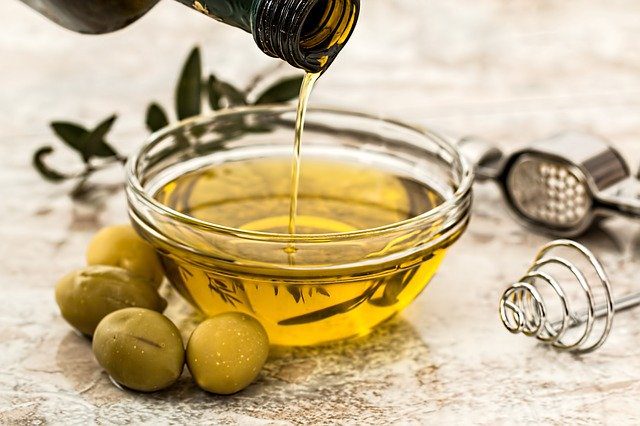When it comes to cooking oil, there is a lot of variety to choose from. But, which oil is right for you? Is olive oil better than sunflower oil for cooking? Sunflower oil and olive oil both are plant-based oils and considered healthy due to healthy fats present in them, but which is better in terms of nutrition, cooking style, and health benefits for disease prevention? Let’s discuss sunflower oil vs olive oil in detail.
Table of Contents
Types Of Sunflower Oil
It is crucial to know about the types of both oils to understand their difference better as sunflower oil and olive oil are quite different from each other.
There are four kinds of sunflower oil, based on different fatty acids composition. Mid oleic acid which has 65% oleic acid, High oleic that contains 82% oleic acid, High oleic/ high stearic has 72% oleic acid and 18% stearic acid.
Sunflower oil is rich in Linoleic (Omega 6 Fatty acids) or oleic acid (Omega 3 Fatty Acids). Both are sources of energy but their reaction to heat is different. High oleic/ high stearic acid sunflower oil contains saturated fatty acids which make the oil solid at room temperature and this type of oil is not recommended for cooking. You can find this oil in packaged food, chocolates, and ice-creams.
Furthermore, mid oleic sunflower oils release toxic compounds while heating at a high temperature of 180° F (or 82° c) which is generally used for deep frying. According to a study, it releases the highest amount of aldehydes into cooking fumes when compared to other plant-based cooking oils. These toxic compounds can increase the risk of cells and DNA damage, heart diseases, and Alzheimer’s disease.
Sunflower oil benefits are due to the oleic acid content (About 80% or more) which is associated with reduction in chronic ailments such as heart problems and high cholesterol.
Also Read : Best Foods For Omega 3 Fatty Acids And Benefits Of Omega 3

Types Of Olive Oil
There are four types of olive oil which are pomace, refined, virgin and extra virgin olive oil. Extra virgin oil is considered the most healthy variety due to the extraction of oil. Olives are pressed without the use of heat or any chemical substance and least processed that’s why it’s also called cold-pressed olive oil. It is full of antioxidants and natural flavor.
On the other hand, refined olive oil has to go through a chemical process which reduces the nutritional value as well as its natural flavor. Extra virgin olive oil is preferred for salads while refined or pomace olive oil is suitable for Indian cooking.
Also Read : How To Cook With Olive Oil – Healthy Cooking With Olive Oil

Sunflower Oil Vs Olive Oil
1) Difference In Fat Content
High oleic acid sunflower oil is enriched with monounsaturated fats which are much better for health than saturated fats. High oleic sunflower oil can help lower bad cholesterol levels (LDL) and increase good cholesterol levels (HDL). Extra virgin olive oil is also rich in monounsaturated fats. Hence we can clearly state that there is no much difference in the oleic acid content of both oils.
2) Difference In Antioxidants
- Vitamin E – Vitamin E is a fat soluble antioxidant that stops the production of reactive oxygen species (ROS) when fat goes through oxidation. It controls the free radicals and prevents chronic diseases. According to food Nutrition Board Of The Institute Of Medicine, all adults need 15 milligram vitamin E every day. You get 5.6 milligram vitamin E from a teaspoon of sunflower oil and less than 2 milligram from a teaspoon through olive oil thus there’s a difference of more than double content of vitamin E. High oleic sunflower oil contains the highest content of vitamin E, not only compared to only olive oil but other edible oils also.
- Vitamin K – Vitamin K protects cellular membranes from damage which occurs due to excess free radicals. It’s required for active mechanism, stopping the bleeding through clotting blood and forming scabs. A man needs 120 micrograms of vitamin K daily. Women, on the other hand, require 90 milligrams of it. One teaspoon of oleic sunflower oil has less than 1 milligram of vitamin K and olive oil offers more than 8 milligrams hence olive oil has the weightage in terms of vitamin K.
- Minerals Difference – Plant oils are not rich in minerals in general. Sunflower oil has zero minerals and even olive oil contains trace amounts of minerals. It has Iron which is required for the functioning of cells that keeps oxygen moving in the blood. It has sodium electrolyte minerals that help in the working of the heart and muscles and the last mineral is calcium which is necessary for strong bones and teeth. Olive oil does contain few minerals. However, they don’t fulfill the satisfactory amount of daily value and we can’t rely on this amount.
3) Anti-Inflammatory Properties
Inflammation is the root cause of many health ailments such as heart diseases, cancer, arthritis, diabetes, and metabolic syndrome.
Sunflower oil is not considered anti-inflammatory in general, in fact, the sunflower oil low in oleic acids is known as pro-inflammatory as they release toxic substances by creating oxidative stress on our cells when exposed to heating. However, high oleic acid is more stable during cooking and safe at fairly high heat cooking.
On the other hand olive oil has powerful anti-inflammatory compounds. According to a study, oleic acid, the most prominent fatty acids in olive oil reduced inflammation markers such as C reactive protein. (2) The antioxidants present in olive oil play a vital role in lowering the inflammation as per another study (3 ). A phenolic compound, Oleocanthal acts like Ibuprofen, a famous anti-inflammatory drug.
4) Heart Health
Heart diseases are increasing at an alarming rate all over the world thus it becomes crucial to choose heart-healthy foods and cooking oil plays a vital role in it. Some studies suggest that high oleic sunflower oils are beneficial in lowering the (LDL) bad cholesterol and raising the (HDL) good cholesterol, as a result, decreasing the risk of heart diseases. A high content of oleic acid or omega-3 refers to the monounsaturated fat which is heart-healthy fats as compared to both polyunsaturated and saturated fats.
A balance of oleic and linoleic acid is very important for the heart. A high amount of oleic acid decreases the inflammation and prevents heart problems. A study on 24 people with high lipids levels for 8 weeks shows that high oleic acid sunflower oil consumption bought a significant increase in good cholesterol as compared to a diet without sunflower oil. (4)
Olive oil is also a great source of monounsaturated fat which is a staple of the Mediterranean diet that’s considered one of the healthiest diets in the world. There is not much difference in the oleic acid content in these oils so, high oleic sunflower oil and extra virgin olive oil both are heart-friendly cooking oils. According to a study olive oil reduces the risk of strokes, heart attacks and death by 30% (5)

5) Price Difference
Even though high oleic acid sunflower oil is one of the best oil for cooking, its available at a cheaper rate as compared to extra virgin olive oil. The price of extra virgin olive oil is more than double. Sunflower oil can be bought with 250/Rs per liter whereas extra virgin olive oil can dig a hole in your pocket which comes with the price of 800/- per liter.
Conclusion
After discussing sunflower vs olive oil we can conclude that High oleic sunflower oil is considered healthy among other varieties of it. It contains heart-healthy fats and its compatibility with high heat cooking makes it a good fit for Indian cooking. Olive oil also contains a high amount of oleic acid too, and provides powerful anti-inflammatory properties which makes it a great oil for shallow cooking and to be used in salads and dips.
Sunflower oil is rich in some antioxidants while olive oil is high in some other but both oils are heart-friendly in moderation. Both oils are stable at cooking but there is a big difference in terms of costing thus you can consider both oils and choose accordingly. If you are suffering from any chronic diseases, consult your doctor or a certified nutritionist before making any sudden or drastic dietary changes.
Disclaimer – This content including advice provides generic information only. It is in no way a substitute for qualified medical opinion. Always consult a specialist or your own doctor for more information before making any dietary changes.


